
Vinayak Narahari Bhave, also known as Vinoba Bhave, was an Indian advocate of nonviolence and human rights. Often called Acharya, he is best known for the Bhoodan Movement. He is considered as National Teacher of India and the spiritual successor of Mahatma Gandhi. He was an eminent philosopher. The Gita has been translated into the Marathi language by him with the title Geetai.

Munna Bhai M.B.B.S. is a 2003 Indian Hindi-language satirical comedy drama film written and directed by Rajkumar Hirani in his directorial debut and produced by Vidhu Vinod Chopra under the production banner of Vinod Chopra Films. The film was released in India on 19 December 2003, and is the first installment of the Munna Bhai film series before its sequel, Lage Raho Munna Bhai (2006). The film stars Sunil Dutt in his final film role as the father to his real-life son, Sanjay Dutt, who stars as the titular character of Munna Bhai, a gangster in the Mumbai underworld. Gracy Singh portrays the female lead, being replaced by Vidya Balan in the sequel, and Arshad Warsi portrays the role of Munna's sidekick, Circuit, while Boman Irani, Rohini Hattangadi, Jimmy Sheirgill and Neha Dubey also appear in the film. Based in Mumbai, the film follows Munna trying to please his father by pretending to be a doctor, but when a doctor, Asthana (Irani), exposes Munna's lies and tarnishes his father's honour, Munna enrolls in an Indian medical college with the help of Circuit. Chaos ensue when Munna, on finding that Asthana is the dean of the college, vows revenge, while also sparking a romance with a house doctor, Suman (Singh), unaware that she is Asthana's daughter and his childhood friend, "Chinki".
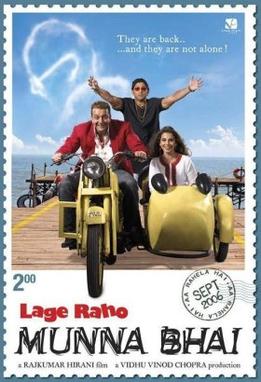
Lage Raho Munna Bhai is a 2006 Indian Hindi-language satirical comedy drama film written, edited and directed by Rajkumar Hirani, who also co-wrote the screenplay with Abhijat Joshi, and produced by Vidhu Vinod Chopra under the production banner of Vinod Chopra Films. The film was released worldwide on 1 September 2006, and is the second installment of the Munna Bhai film series after its prequel, Munna Bhai M.B.B.S. (2003). Sanjay Dutt and Arshad Warsi reprised their roles as Munna Bhai, a gangster in the Mumbai underworld, and his sidekick, Circuit, respectively. Vidya Balan portrays the female lead, replacing Gracy Singh from the original, while several other actors from the prequel, notably Jimmy Sheirgill and Boman Irani, appear in new roles, and Dia Mirza also appears in a small role in the film. In this film, the eponymous lead character begins to see the soul of Mahatma Gandhi, which is portrayed by Dilip Prabhavalkar. Through his interactions with Gandhi, he begins to practice what he refers to as "Gandhigiri" to help ordinary people solve their problems.
"Raghupati Raghava Raja Ram" is a bhajan widely popularised by Mahatma Gandhi and set to tune by Vishnu Digambar Paluskar in Raga Mishra Gara.
Gandhigiri is a neologism in India which is used to express the tenets of Gandhism in contemporary terms. The term became popular due to its usage in the 2006 Hindi film, Lage Raho Munna Bhai.
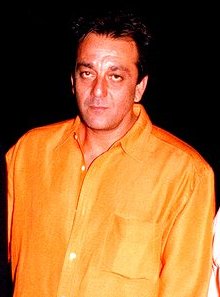
Murliprasad Sharma, better known as Munna Bhai, is an Indian fictional character who appears in the Munna Bhai film series. The character is created by Rajkumar Hirani and portrayed by Sanjay Dutt.

Rajkumar "Raju" Hirani is an Indian filmmaker known for his works in Hindi films. He is the recipient of several accolades, including four National Film Awards and 11 Filmfare Awards. Hirani is referred as one of the most successful filmmakers of Indian cinema. His movies are often lighthearted but revolve around significant societal issues with humour and emotional intelligence.
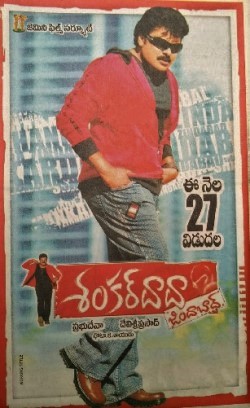
Shankar Dada Zindabad is a 2007 Indian Telugu-language comedy drama film directed by Prabhu Deva. Starring Chiranjeevi and Karishma Kotak, the film is a remake of the 2006 Hindi film Lage Raho Munnabhai and a sequel to Shankar Dada MBBS (2005). In addition, Dilip Prabhavalkar reprises his role as Mahatma Gandhi, while Srikanth and Sayaji Shinde play other supporting roles. The music is scored by Devi Sri Prasad and filmed by Chota K. Naidu.
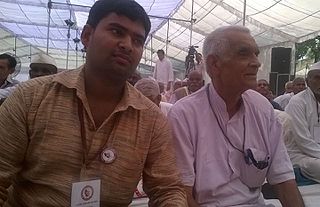
Ramjee Singh is a former Member of Parliament and vice-chancellor of Jain Vishva Bharati University. He is an eminent Gandhian and is the author of a number of books on him. He was also the director of Gandhian Institute of Studies, Varanasi, India. In January 2020 he was awarded the fourth highest civilian award in the country: The Padma Shri for Social Work. His life has been a blend of being a Gandhian academician as well as an activist. Singh has declared Mahatma Gandhi as the Bodhisattva of the 20th century.

Yerawada is a neighbourhood of the city of Pune in the state of Maharashtra, India. Before that British Raj Yerawada was known as Yeraoda. Yerawada is one of the most densely populated areas in Pune. It is located at the beginning of Ahmednagar highway and also on the way to old Pune Airport at Lohagaon. This place can be reached after crossing Mula-Mutha River through Yerawada Bridge from Bund Garden.
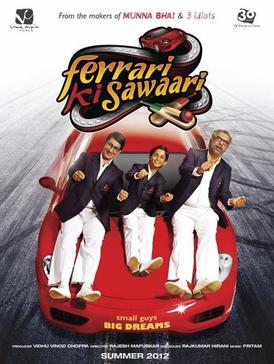
Ferrari Ki Sawaari is a 2012 Indian Hindi-language sports comedy drama film written and directed by Rajesh Mapuskar and produced by Vidhu Vinod Chopra under the production banners of Eros International and Vinod Chopra Films. The film was released in India on 15 June 2012 and stars an ensemble cast of Sharman Joshi, Boman Irani, Ritvik Sahore, Vidya Balan, Paresh Rawal, Seema Bhargava Pahwa, Deepak Shirke, Aakash Dabhade, Vijay Nikam, Nilesh Diwekar and Bhalchandra Kadam.

Yerwada Central Jail is a noted high-security prison in Yerwada, Pune in Maharashtra. This is the largest prison in the state of Maharashtra, and also one of the largest prisons in South Asia, housing over 5,000 prisoners (2017) spread over various barracks and security zones, besides an open jail just outside its premises. Many well known nationalist fighters individuals including Mahatma Gandhi and Jawaharlal Nehru have been jailed here.
Thakurdas Bang was an Indian Gandhian philosopher and Gandhian economist. He was involved in the Indian independence movement. He practised Gandhism, Gandhian philosophy, Gandhian study even at the age of 95. He was also involved in Khadi and Sarvodaya movements. As an economic professor in G S College of Commerce he motivated many students like Madhukarrao Chaudhari, Justice Chandrashekhar Shankar Dharmadhikari and Ramakrushna Bajaj to participate in the freedom struggle. He is succeeded by Abhay Bang and Ashok Bang. Ashok Bang decided to work for issues related to farming and Abhay decided to work for health of villagers. Abhay and Rani Bang founded SEARCH - a non-profit organization in Gadchiroli, which is involved in rural health service and research
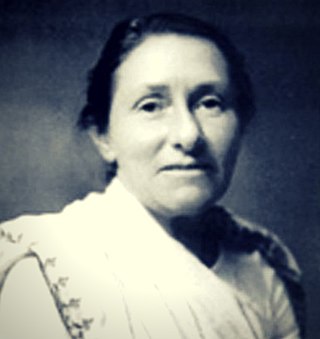
Sarala Behn was an English Gandhian social activist whose work in the Kumaon region of India helped create awareness about the environmental destruction in the Himalayan forests of the state. She played a key role in the evolution of the Chipko Movement and influenced a number of Gandhian environmentalists in India including Chandi Prasad Bhatt, Bimala behn and Sunderlal Bahuguna. Along with Mirabehn, she is known as one of Mahatma Gandhi's two English daughters. The two women's work in Garhwal and Kumaon, respectively, played a key role in bringing focus on issues of environmental degradation and conservation in independent India.
Munna Bhai is an Indian Hindi-language film series created, written and directed by Rajkumar Hirani and produced by Vidhu Vinod Chopra under the Vinod Chopra Productions banner. It consists of Munna Bhai M.B.B.S., released in 2003, and its sequel, Lage Raho Munna Bhai, in 2006. The films share the same characters of Sanjay Dutt as Munna Bhai and Arshad Warsi as Circuit, with different plot elements and settings. Boman Irani features in each film as different characters. Both of the films received widespread critical acclaim and became huge commercial successes of their time.

Shobhana Ranade is an Indian social worker and Gandhian, known for her services towards her cause of destitute women and children. The Government of India honoured her in 2011, with the Padma Bhushan—the third highest civilian award—for her services to the society.
Natwar Thakkar, popularly known as Natwar bhai, was an Indian social worker who worked in Nagaland. He came from Maharashtra but migrated to Nagaland for social work at the age of 23. He founded the Nagaland Gandhi Ashram at Chuchuyimlang village in the Mokokchung district of Nagaland. Because of his efforts to spread Gandhian philosophy in Nagaland and his social work, he was known as "Nagaland's Gandhi".
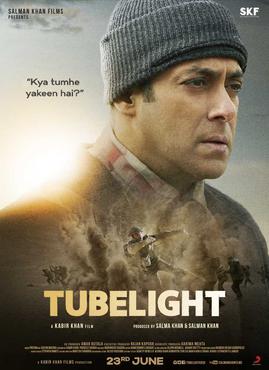
Tubelight is a 2017 Indian Hindi-language war drama film written and directed by Kabir Khan. Produced by Salman Khan and Kabir Khan, it is set in the 1962 Sino-Indian War. It stars Salman Khan and Sohail Khan in the main roles, with Zhu Zhu, Matin Rey Tangu, Om Puri and Mohammed Zeeshan Ayyub in supporting roles. Shah Rukh Khan appears in a cameo in the film. Julius Packiam and Pritam scored the music of the film, with the former composing the film score and latter composing the songs. It is an adaptation of the 2015 American film Little Boy.
Padmanabha Pillai Gopinathan Nair was an Indian social worker, Gandhian, independence activist, and the chairman of Mahatma Gandhi National Memorial Trust. He participated in the Quit India movement of 1942 and worked alongside Vinoba Bhave to promote Bhoodan and Gramdan movements. He was the initiator of the camp movement, a student program that was part of the Construction Movement of Mahatma Gandhi. He was a recipient of the Jamnalal Bajaj Award, among other honors. The Government of India awarded him the fourth highest civilian honour of the Padma Shri, in 2016, for his contributions to society.












